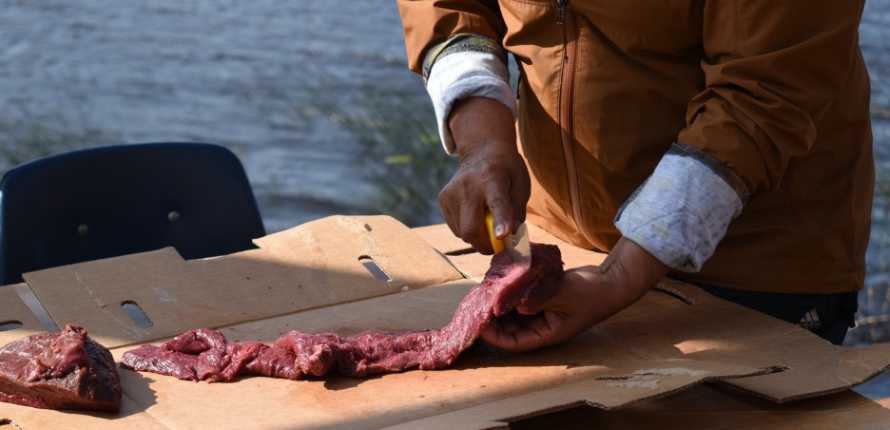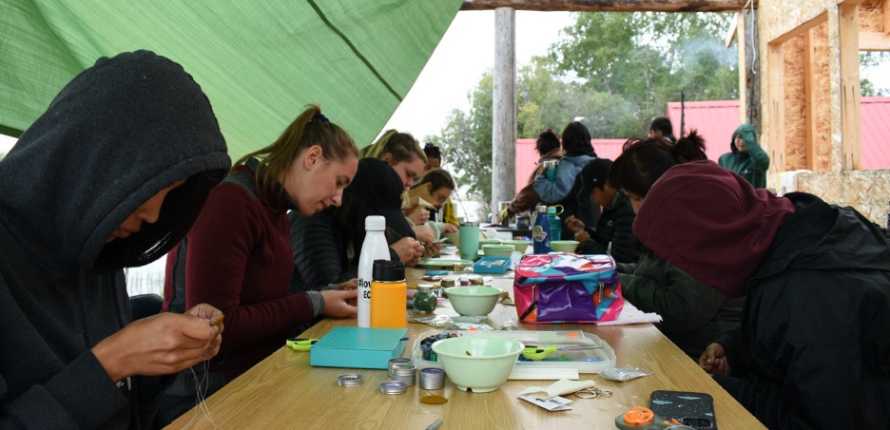We use cookies on this site to enhance your experience.
By selecting “Accept” and continuing to use this website, you consent to the use of cookies.
Search for academic programs, residence, tours and events and more.
On the Land Camps are a way to connect vital Indigenous teaching practices and ways of knowing with scientific tools in traditional languages.

Cutting meat at the camp
On-the-Land camps serve as a bridge between Indigenous Knowledge and Western Science. These camps, planned and facilitated in partnership with Indigenous partners across the NWT, bring together researchers from Laurier and other collaborators with Elders, knowledge holders, and youth in an immersive experience on the land. These experiences exemplify the power of cross-cultural knowledge exchange by providing an engaging environment for youth and community members in hands-on science learning activities and discussions while offering time to be on the land together as a on-the-land-camps This results in increased understanding by all parties involved about the direct impacts of climate change on water, ecosystems, and communities in the NWT. Being on the land together helps to build trust and strengthen relationships between researchers and communities, leading to better research and collaboration in the future. Ultimately, these camps empower participants to gain insights from both perspectives and actively participate in community-based monitoring and science initiatives.
These initiatives yield diverse and impactful outcomes across various domains. The Water Knowledge Camps contribute significantly to the Sahtú communities by developing essential tools while promoting a deeper comprehension of climate change impacts and encouraging community-based monitoring efforts. In the context of the Ka’a’gee Tu First Nation Exploration, these endeavors go further by establishing adaptation plans addressing climate change, food security, and health concerns. Additionally, they actively engage youth and facilitate on-the-land camps, fostering a stronger connection between younger generations and their environment.
Simultaneously, the Northern Research Leadership Camps play a crucial role in engaging Indigenous youth from the Northwest Territories in hands-on scientific activities. These camps serve as catalysts, sparking interest and nurturing skills in studying land use, and comprehending the influence of climate on water resources and ecosystems. Together, these initiatives stand as pillars for education, community engagement, and skill development, creating a substantial impact on both local communities and the broader Northern territories.
In terms of knowledge transfer, these initiatives offer dual knowledge perspectives and diverse approaches to learning, creating a space where the youth can be taught essential ways of being, particularly in sacred places, thereby strengthening Indigenous culture among younger generations. Moreover, the focus on youth engagement is evident through activities that involve local youth in hands-on scientific endeavors and cultural activities, effectively empowering and inspiring them to become future leaders.
A significant emphasis is placed on building relationships within the community. These efforts bring together Elders, youth, scientists, and researchers, fostering a sense of unity and community while promoting honest, open, and meaningful dialogue among these diverse groups. Additionally, these initiatives also contribute positively to the local economy by providing short-term employment opportunities for camp staff and extending financial support to on-the-land camps, thereby stimulating economic growth in the area.

Youths participating in beading activity